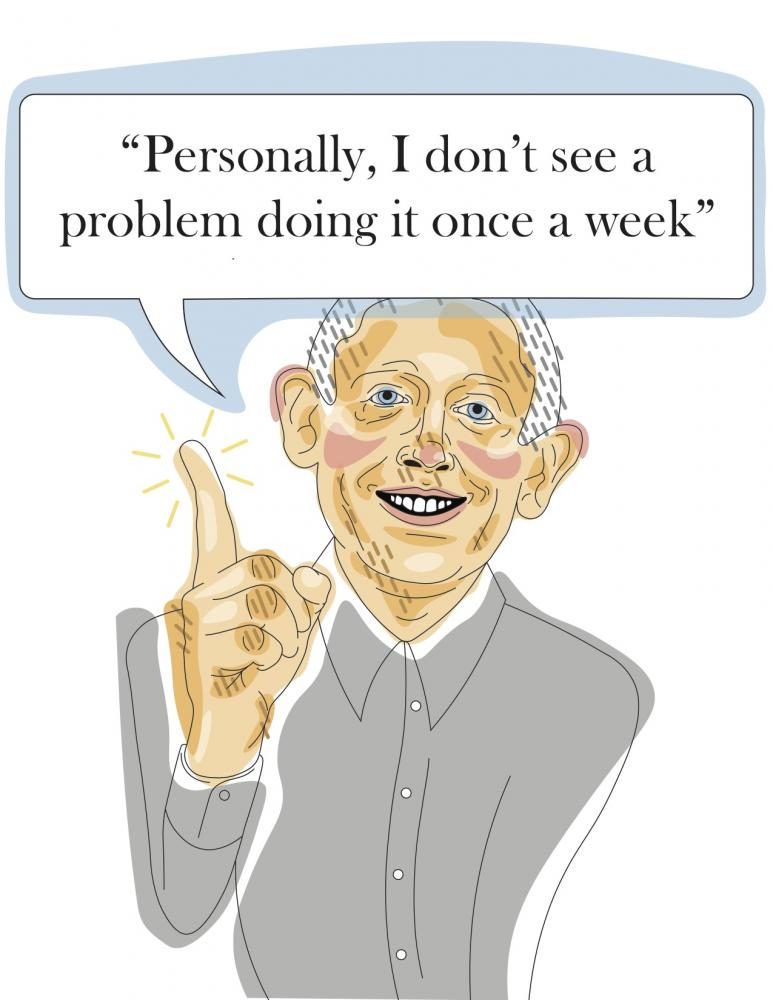For liberty and funding for all
Every Monday morning, starting this year, KHS students can rise to recite their Pledge of Allegiance to their country. Dr. Havener and KHS students comment.
*name changed for anonymity
KHS freshman *Violet says she does not feel comfortable standing in class. It is not because she is presenting or leading a discussion, but rather because she does not feel proud standing up for principles she is uncertain with. Violet feels difficulty when she is asked to stand for the Pledge of Allegiance.
“I don’t believe in any of [the Pledge of Allegiance],” Violet said. “As part of the LGBTQ community, where I wasn’t able to [get married] in America until recently, I can’t see the ‘liberty and justice for all’ part to be true. [Additionally] the ‘united’ part is not true at all. I see all the hate going around, and I just can’t see America as united. I don’t see why [reciting the Pledge of Allegiance] is necessary.”
37 percent (79/126) of the Kirkwood High School population does not stand for the Pledge — TKC poll
However, Missouri state representative Shawn Roden saw it essential for Missouri children to recite the Pledge of Allegiance. The representative of the 111 district, Southwest of St. Louis, introduced House Bill 1750 to the Missouri House of Representatives, in February 2016. The bill would require the reciting of the Pledge of Allegiance no less than once a week in all schools that received funding, in part or in whole, by the Missouri government. The bill passed later that February, in a 12-1 vote on the Standing Committee on Elementary and Secondary Education. At the beginning of the 2017-18 school year it went into effect.
“We used to [recite the Pledge of Allegiance] before, so it’s something that we’re prepared for,” Dr. Michael Havener, KHS principal, said. “The actual law says you don’t force people to do [the Pledge of Allegiance], but it does say that you need to have [The Pledge of Allegiance] happen at least once a week.”
A 2015 House Bill 499, similar to its 2016 counterpart, did require the reciting of the pledge once a week. However, the bill was highly criticized by the Missouri Democrats who cited, according to the Missouri Democratic Caucus, “discriminatory language”. It later died in committee. Havener revealed that the school used to recite the pledge in the morning regardless of whether the the Missouri Senate mandated it or not.
“There [were] some people that didn’t want to do it,” Havener said. “That goes with their First Amendment rights. [However, being singled out] is a possibility if you’re the only one in the class [that isn’t reciting the Pledge of Allegiance], but I think at KHS, people understand that we believe and respect the First Amendment.”
Other than entrusting in the student’s ability to respect their peer’s First Amendment right, Havener and the KHS administrative team have no other method in dealing with the byproducts.
According to Havener, “the plan is for students to not participate” in the Pledge of Allegiance if they do not desire to. According to him his hands are tied in attempting to change the law, and pulling children out of the classroom could do more harm than good. According to Havener, “If we take them out of the classroom then they’ll be more singled out than if they stay in [and not stand to recite the Pledge of Allegiance]. It will just draw more attention to the student.
The only other option for the school, other than giving the opportunity for the Pledge of Allegiance to be recited, is to lose state funding through refusal to give the opportunity. In the world of administering a high school not complying to state law can have negative implementations.
“It can always be [a pull of] funding,” Havener said. “It can also be a loss of accreditation points or something [similar]. The law doesn’t say what could happen if we don’t do it. It just said we need to do it.”
Havener did not voice any remarkable protests to the bill or its amendments*. Other than being slightly concerned with students isolated from their peers, he voiced no opposition about the bill’s implementation.
“Personally, I don’t see a problem doing it once a week,” Havener said. “If it was more than once a week or every day then maybe I would start having problems. If you’re going to lose more class time [it would be a problem]. Some teachers rely on every second.”
Whether the student’s concerns about the bill are valid, or whether the bill will put a stress on class time teachers need, Havener says he believes in the good will of the Missouri representative.
“I think the bill had good intentions,” Havener said. “It is our history. It is part of our country, and whether you agree with it or not I think it had good intentions,”
*Havener did voice concerns about the CPR amendment, an amendment that is mandating that all incoming freshmen must complete a 30 minute CPR course.
“I do have a little concern with the 30 minutes of CPR,” Havener said “To understand CPR, and I am CPR certified, you need to go through the whole course. It’s great to be informed but you need to have a full understanding and to do that you need to practice it. 30 minutes of training to 680 freshmen isn’t going to do that.”
Your donation will support the student journalists of Kirkwood High School. Your contribution will allow us to purchase equipment and cover our annual website hosting costs.
Interests: I play the bassoon for a number of ensembles, as well as the flute for marching band. I am also really involved in social justice, both through...












![“[Fashion is] a means to express myself,” Ezra Birman, senior, said. “I can’t imagine a world where I didn’t dress like this.”
Art by Ally Hudson](https://www.thekirkwoodcall.com/wp-content/uploads/2022/03/ezrapolaroid-e1646944084982-475x318.png)
